- Home
- James A. Michener
The World Is My Home: A Memoir Page 2
The World Is My Home: A Memoir Read online
Page 2
So there we were, underpaid volunteers and overpaid merchant sailors, sharing the same deck, our quarters not far apart, with us in uniform eating slops and them in civilian clothes eating steaks and chops and fresh vegetables. And not only did they eat such meals, they did so in quarters into which we could peek if we wished, and they cooked them in such a way that the aromas drifted over to us, whether we were peeking or not.
If Collins and Hammen were more or less indifferent to the food problem, they were even more outraged than I by another discrepancy. Because there were so many of us naval bodies aboard the Cape Horn and space for the storage of water was so limited, not only was the taking of showers prohibited, there being no way to pipe sea water into the system, but the available supply of drinking water was also restricted. We could actually go thirsty for a day at a time, and I could justify this because of the exigencies of wartime; besides, none of us was in any danger from prolonged thirst. If you were willing to stand in line long enough, you did get something to drink, and at meals there was coffee.
But here a new union rule came into play to protect the civilian sailor: he was guaranteed a certain number of showers a week and with fresh water. So a new indignity confronted us: while we thirsted for water we could not get, the men across the way were taking noisy showers, and lots of them. It was so infuriating that I still bristle when I think of it.
But what was most enraging was the fact that whereas we military personnel had to be extremely careful about showing any light in the darkness, not even the flash of a cigarette lighter, lest a prowling submarine spot us, the civilian sailors seemed not to be bound by this rule. They smoked as they wished, were careless about masking their portholes, and almost constantly provided illumination for any Japanese enemy to spot, even from a great distance. What was worse, the door of the big area across from us was often left wide open so that it was not a fragment of light that escaped but an immense shaft illuminating the entire deck.
‘Ask them to close the door,’ Collins called to me once when I was outside our quarters and he inside, so I crossed the deck and called in politely: ‘Fellows, will you please watch the light?’ It was the first time I had spoken to any of the civilians. It was an unpleasant experience because one of them snarled: ‘Mind your own affairs, Boy Scout,’ but he did slam the door shut.
Now I must digress briefly to explain why the light gave me such distress. When I was a student at a university in Scotland, I had shipped aboard a British merchant ship carrying coal to the Mediterranean and bringing oranges back to Scotland for the making of marmalade, and in long voyages, when I had what might be called honorary papers in the British merchant fleet—salary of one shilling for nine weeks’ work—I learned a great deal about the sea. Because of the intense way I had studied my job I probably knew more about navigation than most of the civilian sailors on the Cape Horn, but what pertained directly to the present situation was that during the years when Great Britain was at war and the United States wasn’t, several of my former shipmates had written to inform me of their adventures: ‘The ship we sailed on together was lost to U-boats off Malta’ and ‘Our Captain Ried has had three ships sunk under him and survived every time. They’re giving him a medal’ and ‘A lot of our boys have gone down. The German subs are dreadful.’ Sea warfare had been painfully brought home to me in those letters.
Furthermore, among my duties prior to coming to the Pacific had been the task of being custodian of secret and highly restricted battle reports from various theaters of war—bombing runs by our planes based in Europe on targets like the Ploesti oil fields in Rumania and the heavy-water plants at Peenemünde in Germany and our naval battles at Coral Sea and Midway—so that I knew rather more about the horrors of war than most, and I took the conflict more seriously. I knew how many British and American ships had been lost to enemy submarines, German and Japanese alike, so I was not at all satisfied when the men across the way refused to darken their door immediately, and did so with ill grace when they finally did. My serious disaffection began at that point.
In the dark and gloomy dungeon that served as our mess deck, where hundreds of unwashed sailors collected three times a day to see what garbage would be served, I had for some reason I could not have explained taken notice of a Navy lieutenant somewhat younger than I—I was thirty-six, one of the oldest civilians drafted in World War II—a man who, in every action, seemed to command attention. He looked exactly like Lieutenant Colonel Oliver North, and as I came to know him, I fell completely under his spell.
I knew him only as Richmond, the city from which he came. He had been, I believe, the head of a construction company and, as such, was accustomed to giving orders and being obeyed. He had adapted easily to Navy life, which he seemed to enjoy, and he held himself and others to high standards of deportment. When, in the first days, there was crowding at the spots where drinking water was made available, he assumed command: ‘All right, you men. Shape up. Form a line starting at that door. You, Lieutenant J. G., post yourself at the door and don’t allow any more to crowd in until these men thin out.’ I was impressed by the way Richmond handled himself and by his obvious desire to see anything with which he might be involved move forward in an orderly way.
The first words he ever spoke to me—I would not have intruded on him—were memorable: ‘Lieutenant, who in hell is running this tub?’ When I told him that rumor said there was a captain of the ship and a commander of troops, but that each stayed drunk in the captain’s cabin, he growled: ‘I can believe it.’
At a later meal he asked: ‘Lieutenant, is this food as god-awful as I think it is?’ and I said: ‘Worse,’ and together we made a quick verbal summary of the miserable swill we were being fed, with him designating certain abominations that he held to be indefensible: ‘To serve what might be decent bacon, if handled properly, in big greasy chunks that look as if they had been cut into cubes by a bayonet is downright disgraceful. Coffee should be hot, no reason to serve it cold. Let me make the pancakes, I’ll turn them out edible. And that slop they serve as stew with stuff you can’t identify or chew, how in hell do they make it?’
On the evening after his first outburst, which covered many more complaints than those I now remember, he thanked Collins for the swig of Southern Comfort Bill allowed him, then joined us at supper, and by chance we were served that night some of the most dreadful stuff so far. No one could detect what it was, although some kind of meat scraps did surface through the rancid grease, and there were potatoes that were supposed to have been mashed, but beyond that it was anybody’s guess. None of us could eat anything but the bread, which itself had been baked without salt and had no flavor.
We four left the table like all the others, hungry and outraged, but the ultimate insult hit when we reached the deck, for from the quarters of the civilian sailors came the infuriating odor of steak properly grilling and hot coffee properly brewed. In addition, the door to their quarters was wide open and casting a brilliant light out to sea.
Richmond was so infuriated that he whipped out his revolver, banged his way into the quarters where the steak was cooking and cried: ‘Darken this door or I will shoot out that light!’ And the civilians, seeing that he was the kind of loose cannon who would do exactly what he said, obeyed.
That spontaneous act launched the work that Richmond and I did together in our exploration of the ship. While Bill Collins and Jay Hammen started to collect, mentally, a list of grievances that our Navy men had to suffer, and they were real and numerous, the kind of offenses that any good captain would correct in a hurry or any commander of troops would insist be corrected, Richmond and I prowled all corners of the Cape Horn and satisfied ourselves on various points as he ticked them off: ‘There is a captain in that cabin up there, but no one ever sees him. And there is an Army colonel in charge of us, but I’ve never seen him either. It’s probable that they’re both drunk all the time. And there is a set of four lockers below containing what has to be food supplies
that can’t be too putrid when they leave the refrigeration.’ Then he had a sharp idea: ‘Let’s see what happens to the good food when it hits the galley,’ and with his .45 moved into visible position and mine still well hidden, we went to where the cooks performed their indecencies. When we saw the disorder, the misuse of equipment and the visible uncleanliness, Richmond exploded: ‘How can self-respecting Navy cooks tolerate this?’
It was a question that, in the phrase popular at the time ‘opened up a whole new can of worms,’ for the chief cook, or the fat, greasy man who claimed to fill that role, told us an amazing thing: ‘We’re not Navy. We belong to the ship. Have for years.’
Richmond dropped his voice and his challenging arrogance: ‘Let’s see if I have this straight. You’re hired by the shipping company, not the Navy?’
‘That’s right.’
‘But who selects the food in those lockers? Who pays for it?’
‘What is this? Who in hell are you?’
Richmond’s question seemed to me so appropriate that I thought the cooks might resist our inquiries, but Richmond had an effective answer: ‘An officer of the United States Navy checking on what’s been going on around here,’ and he delivered these words in such a threatening way that the cooks snapped to attention.
‘O.K. So who buys the food?’
‘We do.’
‘You mean the ship’s officers?’
‘I mean us. Him and me. We know the chandlers.’
‘Just what I thought,’ Richmond said, but since he’d given me no indication that he thought anything, he must have invented his conclusion at that moment. Then he added: ‘I want to inspect those lockers. Now!’
‘You can’t do that, no matter who you are. Company property. Our property.’
Without raising his voice, Richmond placed his .45 on the meat-chopping block, keeping his right hand close: ‘This says loud and clear: “Open those lockers!” ’ and he said this with such an explicit threat that the cooks unlocked them, but Richmond prudently ordered me to stay outside with my gun: ‘We don’t want some clown closing the doors behind us.’
When he was finished with his inspection he took over my guard position and said: ‘Prof, it’s important that you see, too.’ When I went inside I was shocked, for there hung fine cuts of meat while the smaller sections were filled with chickens and chops, and the shelves with firm vegetables.
When I came out I said: ‘Enough in there to feed the whole ship the way we ought to be fed,’ but the cooks, now obviously worried, protested: ‘Hey, wait! That stuff’s for the ship’s crew. Union rules.’
‘All that stuff?’ Richmond asked and he accented the first word so heavily that that cooks knew he could no longer be lied to. So they offered the lame excuse that, yes, much of the food was for Navy passengers, but that it was being held back in case of an emergency. When Richmond asked: ‘What emergency?’ the head cook said: ‘Just an emergency. Any kind.’
Looking at each of the cooks long and sharp, Richmond said: ‘We’ll be back,’ and he left the strong impression that he meant what he said.
We went to a quiet corner of the Cape Horn and Richmond asked: ‘What next?’ We kicked this around for a while with my pointing out: ‘From what I’ve read about ships at sea, let alone the formal Navy, it’s pretty dangerous for anyone to start trouble. Mutiny and all that. The rules are quite stringent.’
‘But isn’t it obvious, Prof, that our government is paying this ship to transport us in reasonably decent style and that someone is taking that money and slipping it into his own pocket?’
‘There are those union rules about feeding the civilian crew properly.’
This angered him: ‘Damn it all, we saw enough food down there to feed an army. We could all be eating the way those others do.’
He suggested that I go back to my own quarters and write out the list of situations that proved the Navy was being shortchanged while he looked into the problem of why we didn’t have enough drinking water. But when I went back to my tiny cabin I found that Collins and Hammen had decided they wanted no part of a formal protest—a prudent decision—because they could not foresee where it might lead. Collins in particular advised me not to go ahead.
I now faced a difficult situation, because I was well aware that for underlings aboard a ship of any kind to form a committee to compile complaints against the captain, no matter how inept he was, could be interpreted as mutinous, and for such an event to take place aboard a Navy vessel, and by juniors in uniform, would almost automatically warrant a court-martial with every likelihood of a guilty verdict with dire consequences. Of course, if a captain went berserk to the point of incapacity, his juniors were obliged to assume command, but even then, so dangerous was such a precedent that a board of inquiry would be convened and perhaps even a court-martial to verify that some intolerable condition existed that menaced the safety not of the sailors but of the ship.
Richmond and I were sailing in dangerous waters. For him the critical moment had been the drawing of his .45 in the cooks’ area. For me it would be the actual drafting of the bill of complaint, and perhaps my danger was the greater, for in Richmond’s case the only evidence against him would be the word of cooks who were probably stealing from the Navy, while in my case the piece of paper would exist as hard proof of my guilt.
Aware of the treacherous maelstrom into which I was navigating, I was about to withdraw when Richmond said: ‘Prof, the only thing that makes sense in this crazy affair is that someone aboard this ship is stealing supplies and selling them ashore. And judging by what we aren’t getting in the mess, that someone must be making a bundle.’
That did it. I felt strongly that if someone was defrauding not only our government and my Navy but also the civilians like me who were being dragged into the battlefields when assignment to the South Seas was abuse enough, I would blow the whistle. Moving to a quiet corner of the deck, I drafted a bill of some dozen particulars that Richmond and I could authenticate, but when I showed it to him he guffawed: ‘Look at your Number seven. You complain that the food is inedible.’
‘It is. You said so at the top of your voice.’
‘But in your Number eleven you say: “And the servings are too small.” ’
When I took back my paper and studied it, I came up with what was for me a logical explanation: ‘For the average sailor the food is inedible, you know that. But for the clowns who are so hungry they eat it anyway, there isn’t enough.’ I did not convince him, so with his help I redrafted my list, and when the war ended and I filed away my papers I saw that original list, with all my points. It still exists as an evidence of how close I came to an actionable military offense, especially since it could be proved that Richmond and I had backed it up with overt action, including his threatening the cooks with his .45.
It came to naught for a hilarious reason. When Richmond and I had our ducks in a row, the formal complaint neatly written out, we marched forward to where the ship’s captain and the troop commander had their quarters to present our complaints, including one that Richmond had uncovered while I was doing my writing: ‘Hell, Prof! They have enough water on this tub to give everyone all we need. What are they saving it for? To make just a little more cumshaw, I do believe.’
But when we reached our superiors’ quarters they handled us in the most effective way possible: they simply refused to see us, or even open their doors to tell us to go away! We stood around for a while, looking silly, then backed off and never did confront the scoundrels.
But now we were angry, and although I cannot speak for Richmond, I know what I felt: ‘Hell, if they want us to run the ship our way, we’ll do it.’ And marching behind Richmond I returned to the cooks’ area and the big lockers, ordered the men to reopen the doors and again stood guard while Richmond went in and broke loose an ample supply of meats and vegetables and processed flour for the making of pancakes and biscuits. We then directed the cooks to prepare for the troops a supper as good as what
the civilian sailors would be getting, and we also released several storage tanks of water. During the rest of our voyage we continued to feed the crew proper food, never making waves or doing anything conspicuously dramatic.
I have often wondered, in retrospect, why our two commanders allowed us to get away with this brazen behavior, and several explanations have come belatedly to mind. The two men had been on this run so many times before that they realized it was no big deal. Japan did not have enough submarines to waste them in these waters and against meaningless targets like our godforsaken bucket. Jittery civilians like Richmond and me might take battle-area rules against lights seriously, but old hands like the crew felt no urgency to follow them. The two commanders must have learned that Richmond had forced open the food lockers at gunpoint and that I had stood guard while he broke out the meat and vegetables, but if we kept things muted and refrained from making open trouble for them, they would make no trouble for us. Furthermore, if they were to arrest us and invoke a court-martial, they would be involved in months of unpleasantness that would have to reveal their mismanagement, so it was wiser to let things slide. Finally, the trip would soon be over and we two troublemakers would be gone, with our misbehavior forgotten and even dismissed. We had been no more than minor pests who would vanish with the breeze.
Eventually I reached the same forgiving assessment of the merchant marine sailors; they were toughened professionals required by the exigencies of the war to bother with a cargo of excited amateurs and their most important task was to protect their own turf: high wages, good meals, hot showers. Looking back, I realize they must have laughed at Richmond and me, but when I tell you later what military job Richmond would be performing on the landing beaches, you will realize that he was not the kind to take anything lightly; and when you learn of my brushes with death and the critical tasks I would be called upon to perform, and the evaluations of others I would be required to make, you will appreciate that I, too, was one who took obligations seriously. Richmond and I had found a ship in disarray, and had taken steps to rectify it, but I no longer have the intense animosity I originally felt toward the union men who saw life differently.

 Mexico
Mexico The World Is My Home: A Memoir
The World Is My Home: A Memoir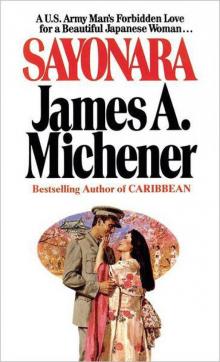 Sayonara
Sayonara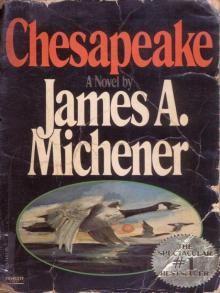 Chesapeake
Chesapeake The Novel
The Novel Rascals in Paradise
Rascals in Paradise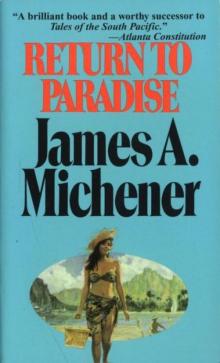 Return to Paradise
Return to Paradise Presidential Lottery: The Reckless Gamble in Our Electoral System
Presidential Lottery: The Reckless Gamble in Our Electoral System The Source
The Source Poland
Poland Space
Space Caravans
Caravans Creatures of the Kingdom: Stories of Animals and Nature
Creatures of the Kingdom: Stories of Animals and Nature Iberia
Iberia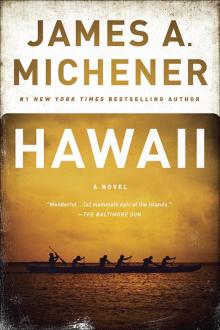 Hawaii
Hawaii The Watermen: Selections From Chesapeake
The Watermen: Selections From Chesapeake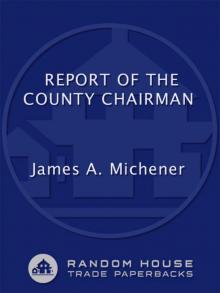 Report of the County Chairman
Report of the County Chairman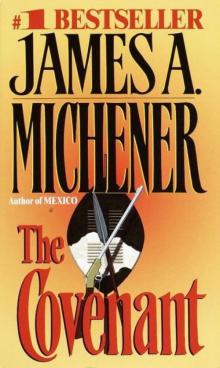 The Covenant
The Covenant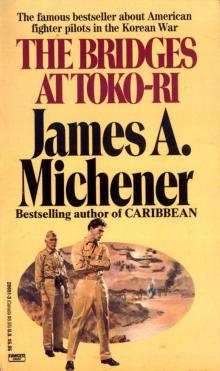 The Bridges at Toko-ri
The Bridges at Toko-ri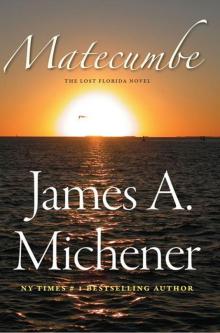 Matecumbe
Matecumbe Journey: A Novel
Journey: A Novel Centennial
Centennial Sports in America
Sports in America Texas
Texas Miracle in Seville
Miracle in Seville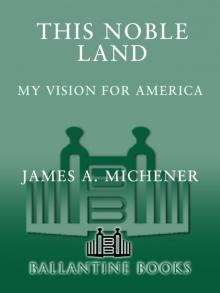 This Noble Land: My Vision for America
This Noble Land: My Vision for America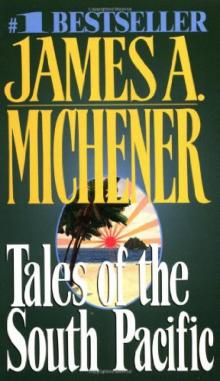 Tales of the South Pacific
Tales of the South Pacific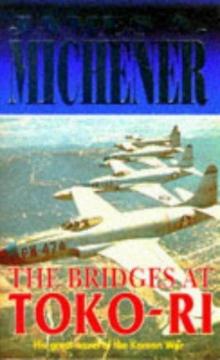 Bridges at Toko-Ri
Bridges at Toko-Ri Space: A Novel
Space: A Novel Presidential Lottery
Presidential Lottery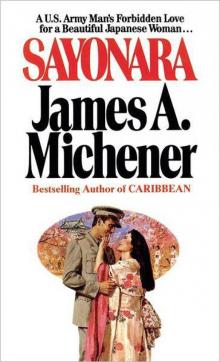 Sayonara: A Novel
Sayonara: A Novel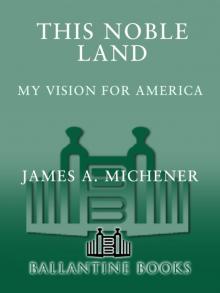 This Noble Land
This Noble Land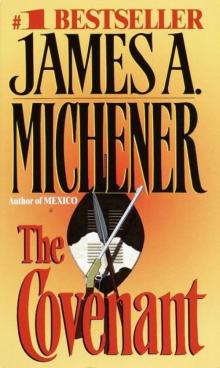 The Covenant: A Novel
The Covenant: A Novel Miracle in Seville: A Novel
Miracle in Seville: A Novel The Bridge at Andau
The Bridge at Andau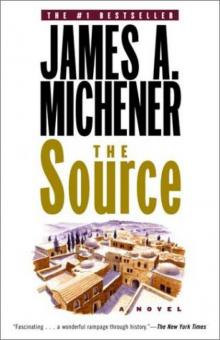 Source
Source The Source: A Novel
The Source: A Novel Journey
Journey Recessional: A Novel
Recessional: A Novel Legacy: A Novel
Legacy: A Novel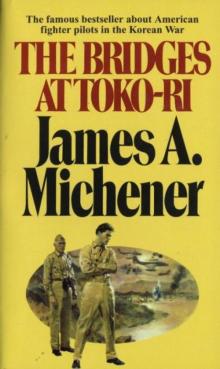 The Bridges at Toko-Ri: A Novel
The Bridges at Toko-Ri: A Novel Poland: A Novel
Poland: A Novel